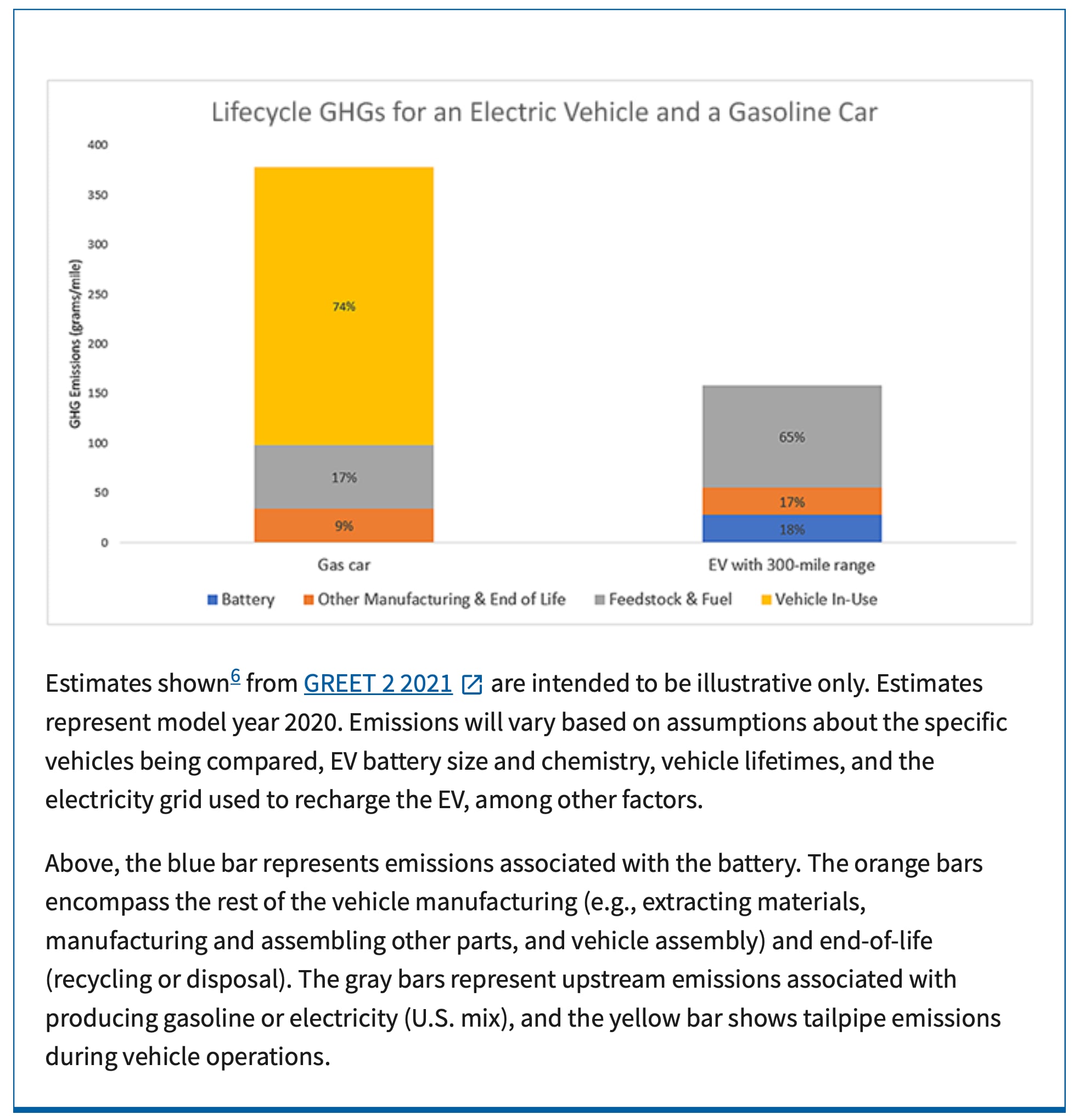Do electric vehicles create more carbon emissions
over their lifetime than gasoline vehicles?
Over the years I have had many people say things to me like "Electric cars are worse for the environment than gasoline vehicles because Electric car manufacturing uses much more carbon than gasoline powered cars do".
Specifically, they say "The environmental impact of the battery manufacturing process is a nightmare as it utilizes much greater amounts of carbon emissions than are required for making a gas powered vehicle."
This has never made much sense to me, but as usual, I decided to do a deep dive to separate-the-fact-from-the-ficiton once and for all.
The United States Environmental Protection Agency (EPA) published an article titled "Electric Vehicle Myths", in which they attempt to address false narrative myths that have been perpetuated.
In their article, the first myth they attempt to dispel is put forth as:
Myth #1: Electric vehicles are worse for the climate than gasoline cars because of the power plant emissions.
The EPA concludes:
• FACT: Electric vehicles typically have a smaller carbon footprint than gasoline cars, even when accounting for the electricity used for charging.
Electric vehicles (EVs) have no tailpipe emissions. Generating the electricity used to charge EVs, however, may create carbon pollution. The amount varies widely based on how local power is generated, e.g., using coal or natural gas, which emit carbon pollution, versus renewable resources like wind or solar, which do not.
Even accounting for these electricity emissions, research shows that an EV is typically responsible for lower levels of greenhouse gases (GHGs) than an average new gasoline car. To the extent that more renewable energy sources like wind and solar are used to generate electricity, the total GHGs associated with EVs could be even lower. (In 2020, renewables became the second-most prevalent U.S. electricity source.)
Learn more about electricity production in your area by visiting EPA’s Power Profiler interactive web page. By simply inputting your zip code, you can find the energy mix in your region.
EPA and Department of Energy's (DOE’s) Beyond Tailpipe Emissions Calculator can help you estimate the greenhouse gas emissions associated with charging and driving an EV or a plug-in hybrid electric vehicle (PHEV) where you live. You can select an EV or PHEV model and type in your zip code to see the CO2 emissions and how they stack up against those associated with a gasoline car.
My understanding it the EPA is arguing that in the United States, there has been a trend whereby we have been quickly increasing the amount of renewable sources of electricity, which is a trend likely to continue into the future.
This next issue addressed by the ETA represents the argument I hear most from people who argue the manufacturing process for electric cars is much worse for the environment than for manufacturing gas vehicles due to the environmental impact of battery manufacturing.
Myth #2: Electric vehicles are worse for the climate than gasoline cars because of battery manufacturing.
The EPA puts forth the following analysis:
• FACT: The greenhouse gas emissions associated with an electric vehicle over its lifetime are typically lower than those from an average gasoline-powered vehicle, even when accounting for manufacturing.
Some studies have shown that making a typical EV can create more carbon pollution than making a gasoline car. This is because of the additional energy required to manufacture an EV’s battery. Still, over the lifetime of the vehicle, total GHG emissions associated with manufacturing, charging, and driving an EV are typically lower than the total GHGs associated with a gasoline car. That’s because EVs have zero tailpipe emissions and are typically responsible for significantly fewer GHGs during operation (see Myth 1 above).
For example, researchers at Argonne National Laboratory estimated emissions for both a gasoline car and an EV with a 300-mile electric range. In their estimates, while GHG emissions from EV manufacturing and end-of-life are higher (shown in orange below), total GHGs for the EV are still lower than those for the gasoline car.
Source: United States Environmental Protection (EPA) Agency Report titled, "Electric Vehicle Myths".
The information put forth by the EPA radically refutes the argument that says electric vehicle manufacturing is way worse for the environment than gasoline powered car manufacturing.
The way I see it is that Electric Vehicle manufacturing is much healthier for the environment in the short and long-term, and here is why:
First of all, the process of gasoline will ONLY every be what it is today, and will not be offset more in the future by renewables. Same with Coal burning which is an environmental nightmare.
Clean renewables are clearly the future, whether they are nuclear, hydroelectric, solar or wind powered. As time goes by, I believe renewable will increase.
There is a great deal of disruptive innovation occurring in the space of battery recycling. The leader in this space is no other than Tesla co-founder, J.B. Straubel of Nevada-based Redwood Industries.

















No comments:
Post a Comment